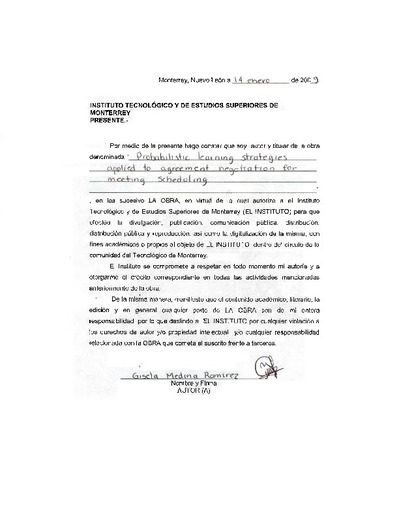| dc.contributor.advisor | Garrido Luna, Leonardo | |
| dc.creator | Medina Ramírez, Gisela | |
| dc.date.accessioned | 2015-08-17T10:15:26Z | en |
| dc.date.available | 2015-08-17T10:15:26Z | en |
| dc.date.issued | 2008-12-01 | |
| dc.identifier.uri | http://hdl.handle.net/11285/569146 | en |
| dc.description.abstract | This document presents the thesis required to get the degree of Master in Science
in Intelligent Systems. One of the problems more commonly found in Artificial Intelligence is related to negotiation where all participants involved in the decision process
have to reach an agreement in a way that minimize costs for each participant; this
problem is known as Distributed Agreement Problem. Our specific problem is focused
on Multiagent Meeting Scheduling where several variables are considered for selecting
the best schedule which fulfills the requirements and preferences of each participant.
Recently there is a necessity to find optimal solutions to problems of this type to satisfy
the demands on time, quality and productivity into a competitive society. The research
work described in this thesis is mainly focused on probabilistic multiagent learning for
the selection of the best strategy applied in specific scenarios. We are using the approach of Crawford ([Crawford 05b]) about Playbooks to select the best negotiation
strategy taken for an agent that acts as organizer or invitee in a meeting scheduling
negotiation. In this approach the agent who uses the playbook is the only learning
agent in the environment, the others agents are using static strategies. In our research
work we implement several negotiation strategies and use the playbook to select the
best one; our contribution is to use new and adapted strategies using several heuristics
to make the agents more cooperative or competitive. This research work is focus on
the development of modified algorithms applied to our multiagent meeting scheduling,
in specific modified negotiation strategies helped by some learning algorithms. We put
all these together and did a set of experiments to see the complexity, usefulness and
performance of the algorithms in several scenarios | |
| dc.language | eng | |
| dc.publisher | Instituto Tecnológico y de Estudios Superiores de Monterrey | |
| dc.rights | info:eu-repo/semantics/openAccess | |
| dc.rights.uri | http://creativecommons.org/licenses/by-nc-nd/4.0 | * |
| dc.subject.classification | Area::CIENCIAS SOCIALES::CIENCIAS ECONÓMICAS::ORGANIZACIÓN Y DIRECCIÓN DE EMPRESAS | es_MX |
| dc.title | Probabilistic Learning Strategies Applied to Agreement Negotiation for Meeting Scheduling -Edición Única | en |
| dc.type | Tesis de maestría | |
| dc.contributor.department | Tecnológico de Monterrey, Campus Monterrey | en |
| dc.contributor.committeemember | Brena Pinero, Ramón | |
| dc.contributor.committeemember | Terashima-Marín, Hugo | |
| dc.contributor.mentor | Acevedo Mascarua, Joaquín | |
| refterms.dateFOA | 2018-03-20T09:22:31Z | |
| refterms.dateFOA | 2018-03-20T09:22:31Z | |
| dc.identificator | Campo||5||53||5311 | |



